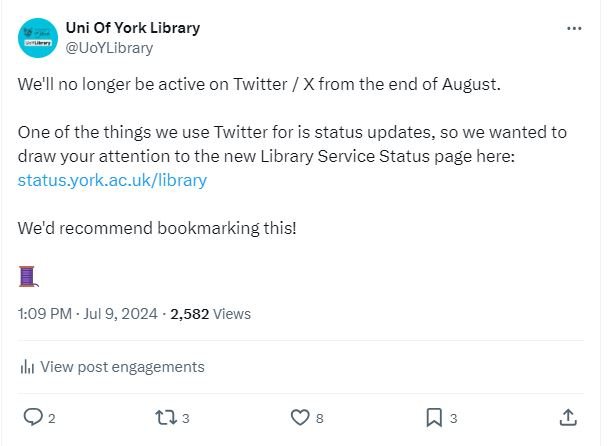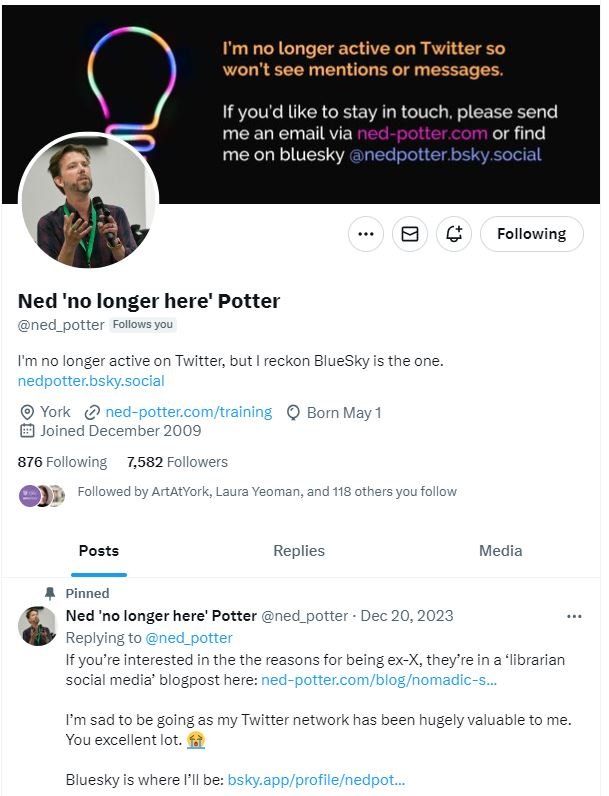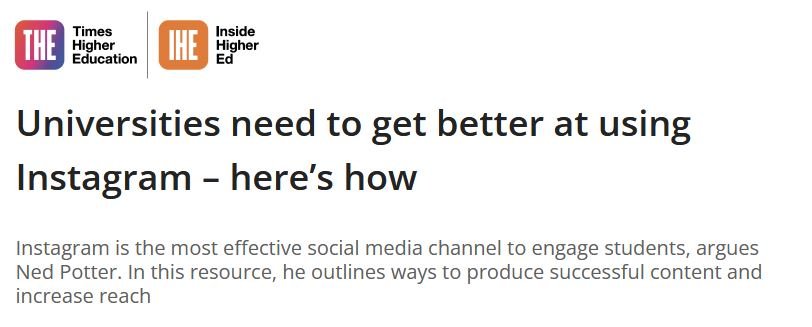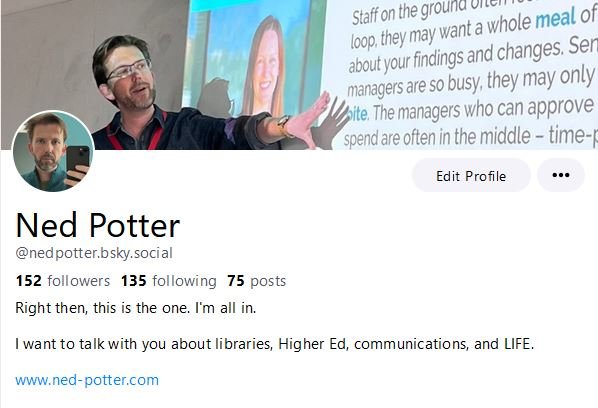In previous posts on becoming ex-X I’ve stopped short of saying *everyone should* leave the hellscape formerly known as Twitter. Mainly because people have built up networks which may not be re-creatable elsewhere, and they were there before Musk came along, so why SHOULD they have to move? But recent events have made me question this, especially when it comes to libraries, museums, archives and Higher Education.
I saw this post from Kevin Gannon on BlueSky which sums it up about right:
I have been leery about unilateral declarations on what people should or shouldn't do about Twitter, bc I know there are networks that have been built there which are irreplaceable. But at this point, I just don't see any way one can ethically use that site. www.independent.co.uk/news/uk/poli...
— Kevin Gannon (@thetattooedprof.bsky.social) Aug 7, 2024 at 15:15
[image or embed]
Musk is actively encouraging division, and helping to incite riots. He’s spreading far-right conspiracy theories. He’s talking about civil-war in the UK. There is simply no other circumstances in which our organisations would be complicit in using, and therefore encouraging use of, a platform whose owner not only espouses such dangerous views but uses the platform itself to amplify them. Our presence on X is an implicit endorsement. We shouldn’t be there.
So how do you get off Twitter? For what it’s worth here’s what I’ve done with my library.
1: Set a date, and tell people
As tempting as it is to leave now, we need to give our users time to hear that we’re leaving, digest this, and make alternative plans to get news from us. In January this year I decided @UoYLibrary would leave Twitter by the end of August, so we had a clean break for the new academic year.
The long lead-in time has been helpful. I wrote a briefing paper for senior leadership in February explaining why we were doing this, and shared it with the comms group, which led to some really good suggestions as to how to mitigate the impact, more on which below. We also announced our intention to leave Twitter on Twitter itself in July, so our audience there had time to get used to the idea and follow us on alternative platforms. It says it in our bio as well as our pinned tweet.
We’ve since reposted about this news, and have now done a nice little ‘favourite twitter moments’ round-up thread of some semi-viral tweets and nice interactions we’ve had over the years. These were nice to revisit in and of themselves - we’ve loved being there for 99% of the time - and will also serve to get the word out to more Twitter users before we go.
2. Consider creative ways to mitigate the impact on your Twitter audience
What do we lose by leaving Twitter? You can think about it in terms of both content (we tweet about this, and that) and audiences (those people will be fine because they follow us on Insta, these people won’t because they don’t see messages elsewhere).
Content-wise, we’ve had some lovely creative times with Twitter over the years, but as it’s become more broken and less functional we’re really reduced use of it to basic status updates - building A is closing early today, resource B is now available, service C launches today etc. So we’ve built a library status page (which we’re encouraging people to bookmark) that tells them this info without needing Twitter.
@uoylibrary So is #SatisfyingLibraryUpdates going to catch on? Well here’s one: with info on student curators, 24/7, a new exhbition and our sensory rooms which are opening soon. #unifyork #library #sensoryrooms #libinspo #librariesoftiktok #studytips #UoYTips #satisfying ♬ original sound - Uni of York library
We use Instagram Stories (see the pinned examples on our profile here) to say the sort of things we’d previously have put in Tweets, and occasionally use TikTok for general updates too, so of course we’re encouraging our Twitter audience to follow us there if they use those platforms.
[Sidenote: I’ve invented - actually I’m sure I didn’t really invent it and lots of people to do this - a way to get news updates via the video medium called ‘satisfying updates’ where I use the duet function on TikTok to give the students something satisfying to look at whilst sticking around long enough to hear key updates from me…]
Then we come to audience - in very simple terms almost all of our undergraduates are on Insta and TikTok between them so we know they’re well covered. PGTs are increasingly on Instagram too, and more and more Researchers are heading there. Academics are, for us, the problem audience that we can’t reach easily without Twitter - they’re not all going to the same place when they leave Twitter, and while BlueSky shows promise it isn’t there yet in terms of a critical mass of York academics using it. So we’ve spoken to the central University comms team and asked if they’d be willing to tweet perhaps three or four really important things about the library each year (things like 24/7 opening for exams) which they’re happy to do, and we’ll make sure our more internal marketing routes, such as the ones offered by the Faculty Librarian Team I co-manage, step up too.
Obviously your audiences may be completely different to ours if you’re not an academic library - so use all the data you have to try and work out which demographic is most reliant on Twitter for info about your org, and see if there’s any other way to reach them. Don’t rule out non-social media options too - one of the things we’re going to do is put more posters up in the colleges where all the PGRs are!
3. Make sure you turn off Grok data sharing
Twitter recently activated an on-by-default, unannounced, data-sharing setting where everything you’ve ever tweeted can be used to ‘train’ Grok, Twitter’s stupid LLM AI bot thing. You don’t want that. No one wants that. Get it in the bin.
If anyone's wondering how things are going on the hellsite: This setting was just turned on by default for everyone. if you still have an account with content, go log in and disable this so Grok can't use your tweets as training data. Direct link: twitter.com/settings/gro...
— Corey (@coreyjrowe.bsky.social) Jul 26, 2024 at 03:17
[image or embed]
Here’s the direct link to the Settings to turn data sharing off - it works on desktop but not, I hear, on mobiles.
4. keep the account
I’ve wrestled with this a bit - any social media account that is out there in the world is, in effect, a front window for your organisation. So keeping an account alive even when it’s not active is problematic - people may still send DMs which will go unanswered; people could find old tweets and reply to them and we wouldn’t see it, etc. However, I don’t want to lose the account name and let someone else take it and potentially impersonate the library, and there is of course a tiny, tiny possibility that Twitter may one day be habitable again, so I’ve decided it’s better to keep the account.
A final decision I need to make on this whether to lock it when we leave. At the moment I’m leaning towards locking, to reduce the chances of new people seeing the account, missing all the ways we’ll try and flag that it’s not active, and then trying to get help or guidance we can’t give by asking questions on the platform. Which brings us to…
5. Make it really, really obvious the account is no longer active
Subtlety is not your friend here. I’ve seen professional accounts who’ve left without changing their bio - we really need to make it unquestionably obvious we’ve left.
Here’s what I did with my own account when I left Twitter:
So that checklist of ways I’ve tried to flag I’m not there, in full:
Says it in my name
Says it in my bio
Says it in the banner pic
Says it in the pinned tweet
I must confess I don’t know if this has worked or not, because I’ve not logged back in since I left. I tried recently, to disable to the Grok AI LLM thing mentioned above, but it requires 2FA I can’t get without logging in, so I’m stuck… I don’t know, therefore, if there are loads of DMs or people @ing me and thinking I’m rude for not replying - I hope there aren’t, and I’ve done everything I can to avoid that. I’ll be doing the same with @UoYLibrary in a couple of weeks.
finally: How much do we explain why we’re leaving?
A decision I’ve not yet made is, do we write a library news post where we fully go into the details of why we’re leaving? I’d be genuinely interested to know what people think about this, if you fancy leaving a comment below.
Obviously the pro is, we’re a library, we’re taking an ethical stance, and we want our users to know about it. We want them to get the reasons why. I was speaking to a librarian at another organsiation whilst doing some social media training recently, and she said as a parent she’d be really proud of her kid’s University doing this.
The con is, quite honestly, opening up the possibility of a prolonged debate with some Musk fans, and using up comms bandwidth we REALLY need for other things on the sort of conversations where everyone gets angry but no one changes their mind. (Classic Twitter-these-days conversations, in fact.) It’s also hard to talk about why you’re leaving without sound judgemental towards the people choosing to stay, and we have no wish to be judgemental. So as of right now, I don’t know if there’ll be a big rationale-reveal type post, or we’ll just leave it at ‘Twitter is no longer working for us’.
Since we announced we’re leaving Twitter we’ve not had any negative feedback about it. We left Facebook a couple of years back - with not a single complaint from anyone - and it is genuinely freeing to be on one less platform. As pretentious it sounds, social media benefits from your creative energy needing to be split fewer ways, in my experience. I was confident becoming ex-X was the right thing to do for our library when I first decided it at the start of year, and I’m still confident now - what’s more we’ve done some really useful things to lessen the negative impact on our users.
I’d recommend taking the steps above, and doing the same. If anyone is interested in the rationale briefing paper I wrote for our Leadership Team send me an email and I’ll share it with you; here’s how it ends.
By stopping our use of X from September, we will be upholding our values, adapting to the changing landscape of social media by jettisoning a platform no longer delivering value, and freeing up capacity to work on more impactful communications.





